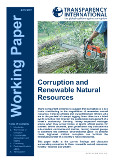a reassessment of the West's first great water transferOwens Valley revisited
Pluralismo Legal, Reforma Hïdrica y Polïticas de Reconocimiento
WORKING PAPER 01/2007: CORRUPTION AND RENEWABLE NATURAL RESOURCES
There is important evidence to suggest that corruption is a key factor contributing to the degradation of renewable natural resources. Forestry officials and law enforcement officers who are in the pockets of corrupt logging firms often turn a blind eye to activities that threaten the sustainable management of a forest’s biodiversity. Similarly, fishery inspectors endanger stocks when they accept bribes to ignore official quotas for trawlers.
Water rights and wrongs: a young people's summary of the United Nations Human Development Report 2006, Beyond Scarcity: power, poverty, and the global water crisis
Aimed at young people, this booklet presents key points from the 2006 Human Development Report on water scarcity and its effects on human life. The report is user-friendly, using photographs and illustrations, stories from young people, basic data on the health effects of poor-quality water, and examples of efforts to bring water to poor communities.
Technology Adoption under Production Uncertainty: Theory and Application to Irrigation Technology
We propose a theoretical framework to analyze the conditions under which a farmer facing production uncertainty (due to a possible water shortage) and incomplete information will adopt a more efficient irrigation technology. A reduced form of this model is empirically estimated using a sample of 265 farms located in Crete, Greece. The empirical results suggest that farmers choose to adopt the new technology in order to hedge against production risk.
Why enough is never enough: The societal determinants of river basin ‘overbuilding’
Keeping an eye on decentralization and specification of a resource policy: An overview of the policy study to the promotion of RWH
How to reallocate water rights when environmental goals conflict with existing entitlements
Emerging concerns for environmental flows translate into reforms that aim to preserve minimal flows in rivers. These policy measures have consequences for traditional right-holders: how to share between consumptive users the new scarcity created by the protection of instream flows? This paper compares different policy mechanisms in France, Australia and California in an attempt to answer the questions of how to allocate water restrictions and compensations and how to pursue simultaneously efficiency, equity and acceptability objectives.




